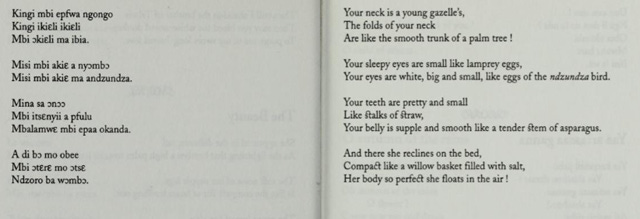Hello Friends,
Eroticism is not usually one of the first things which come to my mind when I think about traditional African cultures. This is not to say that the erotic is not known, appreciated or celebrated in African cultures, far from it. For most African people, the erotic and other things of a sexual nature are woven into community life. It shows up in song and dance, in riddles and poetry, and in an array of attitudes and practices with associated rules and etiquettes. While it is true that in many African cultures, there is a certain level of subtlety or reserve used when discussing matters of sex, the idea that African people are sexually conservative does not hold up under the weight of even the most casual scrutiny.
What might look like conservatism on the surface often turns out to be an effort to ensure that the sheer power of the erotic to induce sometimes uncontrollable passions is handled with the appropriate care. In traditional societies of the past, this often meant that once a person underwent the necessary tests and initiations, they were allowed into a world of erotic stimulation which ranged from delicate and refined, to explicit and pornographic.
Take the imagery in this poem from the Mbosi (Republic of Congo) for example:
On the other end, consider the unbridled sexuality of the Chura dance (also known as Baikoko) from the coastal region of Tanzania. This is a dance reportedly taught to girls by older women as part of their rites of passage into womanhood.
What does this mean for modern Africans, often burdened with the colonial legacy of Victorian era sexual values, who want to remember and honor traditions in a world dominated by Western popular culture which, ironically, now seems too sexually permissive? What does this mean for people trying to reclaim traditional African erotic aesthetics from what Kenyan philosopher John Murungi describes as an exoticization and fetishization with subtle or not so subtle suggestions of barbarism that has resulted in the subjection of the African body to a racist regime which, in an effort to distance the African body from the European body, alienates Africans from their own bodies, generating and perpetuating a distorted aestheticism in both the African and the global mind? What does this mean for queer Africans or for girls and women who often bear the brunt of these conflicting sexual politics?
Well, first, we should know our subject matter. This is what the current sequence of episodes in the Mythological Africans Deep Dive Series is addressing. Recently released Episode 12 focuses on heterosexual practices. Episode 11 delved into the complexities of being intersex and African, and Episode 10 was an overview of the various dimensions of African Sexualities which will be discussed. Upcoming episodes will focus on lesbian and gay culture, as well as transgender and other gender mixing cultures of the African continent.
The Deep Dive series is not the only place where we’re exploring the beautiful complexities of African peoples!
We’ll be at The Urban Nerd Con in Montgomery, Alabama starting Friday July 29th. Check out this schedule! If you can’t attend, be sure to join the MA Twitter Space which will be live from the conference.
Also, MA is collaborating with Memphis-based artist and storyteller Cairo Tatum on a series of illustrations of mythical creatures from African folklore. Cairo’s love for storytelling comes from his grandmother, the late Akiba Shabazz, who was a librarian, playwright, musician, and storyteller. Keep an eye out for this starting in August and don’t forget to follow Anansi Archive on Twitter for updates!
Also in August, I will be joining the phenomenal Laura Gibbs at the MyFest Reader’s Room to talk about the many delights of curating stories from African Mythology and Folklore. Laura and I had a chance to talk about our intersecting work earlier this year and it will be such a treat to talk with her again!
It remains my absolute pleasure and honor to be with you on this journey. Thank you!
Be well,
Helen





